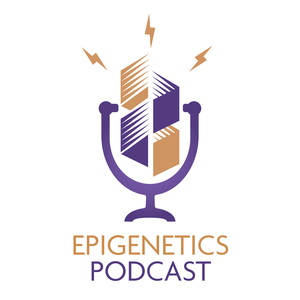In this episode of the Epigenetics Podcast, we talked with Erica Korb from the University of Pennsylvania about her work on BRD4 and the histone variant H2BE, which influences synaptic genes and neuronal activity.
Dr. Korb discusses the focus of her lab, which centers on epigenetic mechanisms impacting gene regulation in neurons. Her research primarily examines histone biology and its connection to neurodevelopmental disorders, including autism spectrum disorder and intellectual disabilities. Dr. Korb expounds on the collaborative environment at UPenn’s Epigenetics Institute, emphasizing how the rich diversity of research topics fosters innovative ideas and projects within the community.
Reflecting on her earlier work from her postdoctoral studies, Dr. Korb discusses her first significant findings regarding the protein BRD4. This work demonstrated BRD4's role in mediating transcriptional regulation crucial for learning and memory processes. She explains how disrupting this protein's function in neurons hindered critical gene activations required for memory formation in mice. This foundational understanding opened avenues for exploring the broader implications of chromatin regulation in various neurodevelopmental conditions.
Transitioning into her current research endeavors, Dr. Korb reveals how she aims to expand her focus beyond Fragile X syndrome. With her lab now investigating multiple chromatin regulators implicated in various forms of autism spectrum disorders, she describes a recent project where RNA sequencing exposed substantial overlaps in gene expression changes associated with five distinct chromatin modifiers, each contributing uniquely to neuronal function while collectively demonstrating sensitivity to chromatin disruptions.
A significant portion of the discussion centers around Dr. Korb’s unexpected exploration into how COVID-19 intersects with chromatin biology through a phenomenon known as histone mimicry. Leveraging bioinformatic tools during the pandemic, her lab discovered that certain viral proteins mimic histone sequences, which may lead to altered transcriptional outputs in host cells. This coincidental finding illustrates both the creative adaptability needed in scientific research and the importance of collaborative efforts across disciplines to uncover new insights.
The conversation also delves into Dr. Korb’s recent work regarding the histone variant H2BE, initiated by one of her graduate students. She explains how prior research only recognized H2BE's expression in the olfactory system, yet her lab has demonstrated its significant role in regulating synaptic genes and memory formation throughout broader neuronal contexts. Notably, they identified a single amino acid change that influences H2BE's function in chromatin accessibility and gene transcription, emphasizing its potential evolutionary conservation across species.
In terms of H2BE's role, Dr. Korb elucidates that its activity is integral in response to extracellular stimuli, particularly within the context of neuronal activation. Intriguingly, they found that H2BE expression decreases in reaction to long-term neuronal stimulation, suggesting a complex mechanism of homeostatic plasticity crucial for regulating neuronal activity levels. This research not only advances understanding of chromatin dynamics but also holds implications for neuronal health and disease mechanisms.
References
Feierman, E. R., Louzon, S., Prescott, N. A., Biaco, T., Gao, Q., Qiu, Q., Choi, K., Palozola, K. C., Voss, A. J., Mehta, S. D., Quaye, C. N., Lynch, K. T., Fuccillo, M. V., Wu, H., David, Y., & Korb, E. (2024). Histone variant H2BE enhances chromatin accessibility in neurons to promote synaptic gene expression and long-term memory. Molecular cell, 84(15), 2822–2837.e11. https://doi.org/10.1016/j.molcel.2024.06.025
Korb, E., Herre, M., Zucker-Scharff, I., Gresack, J., Allis, C. D., & Darnell, R. B. (2017). Excess Translation of Epigenetic Regulators Contributes to Fragile X Syndrome and Is Alleviated by Brd4 Inhibition. Cell, 170(6), 1209–1223.e20. https://doi.org/10.1016/j.cell.2017.07.033
Kee, J., Thudium, S., Renner, D. M., Glastad, K., Palozola, K., Zhang, Z., Li, Y., Lan, Y., Cesare, J., Poleshko, A., Kiseleva, A. A., Truitt, R., Cardenas-Diaz, F. L., Zhang, X., Xie, X., Kotton, D. N., Alysandratos, K. D., Epstein, J. A., Shi, P. Y., Yang, W., … Korb, E. (2022). SARS-CoV-2 disrupts host epigenetic regulation via histone mimicry. Nature, 610(7931), 381–388. https://doi.org/10.1038/s41586-022-05282-z
Feierman, E. R., Paranjapye, A., Su, S., Qiu, Q., Wu, H., & Korb, E. (2024). Histone variant H2BE controls activity-dependent gene expression and homeostatic scaling. bioRxiv : the preprint server for biology, 2024.11.01.620920. https://doi.org/10.1101/2024.11.01.620920
Related Episodes
Neuroepigenetic Mechanisms and Primate Epigenome Evolution (Boyan Bonev)
DNA Methylation Alterations in Neurodegenerative Diseases (Paula Desplats)
The Role of Histone Dopaminylation and Serotinylation in Neuronal Plasticity (Ian Maze)
Contact
Epigenetics Podcast on Mastodon
Epigenetics Podcast on Bluesky
Dr. Stefan Dillinger on LinkedIn
Active Motif on LinkedIn
Active Motif on Bluesky
Email:
[email protected]


